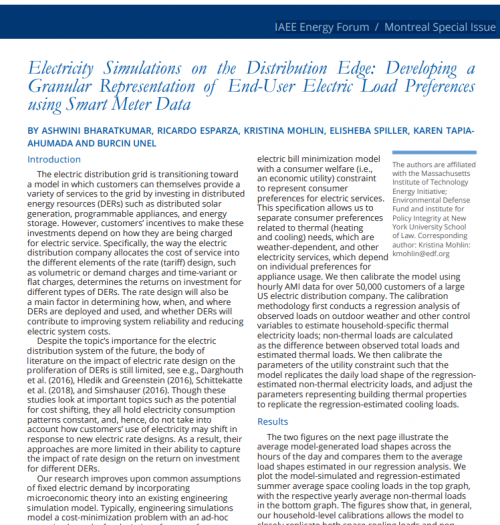-
Comments to EPA on New York’s Clean Air Act Petition
The Environmental Protection Agency (EPA) proposed to deny New York’s Clean Air Act Section 126 Petition seeking reductions in pollution from upwind sources that significantly impede the state’s attainment of ozone pollution standards. We submitted comments explaining how EPA’s justification for the decision is flawed.
-
Comments to HUD on Housing Assistance Restrictions for Immigrant Families
The Department of Housing and Urban Development (HUD) recently proposed a rule that would deny housing assistance to some immigrant households. We submitted comments focusing on serious flaws in HUD’s analysis of the rule’s impacts.
-
Title X Women’s Health - Ninth Circuit Amicus Briefs
In April, district courts in Washington State, Oregon, and California blocked a Trump administration rule that makes harmful changes to the federal funding of women’s health services. Those decisions were recently appealed in the U.S. Court of Appeals for the Ninth Circuit. We filed amicus briefs arguing that the preliminary injunctions should be affirmed.
-
Comments to FDA on Sunscreen Products
In February, the Food and Drug Administration (FDA) proposed a rule that would strengthen regulations for sunscreen products. We submitted comments explaining how FDA can improve its analysis of the rule’s impacts.
-
Amicus Brief on HHS Conscience Rule
The Department of Health and Human Services (HHS) recently finalized a rule that expands protections for healthcare workers who deny care based on moral or religious beliefs. We submitted an amicus brief in support of challenges to the rule filed by states, municipalities, medical organizations, and civil-rights advocates. The brief details how HHS’s analysis of the rule’s economic impacts ignores significant costs while touting entirely speculative benefits.
-
Electricity Simulations on the Distribution Edge
Developing a Granular Representation of End-User Electric Load Preferences using Smart Meter Data
The electric distribution grid is transitioning toward a model in which customers can themselves provide a variety of services to the grid by investing in distributed energy resources (DERs) such as distributed solar generation, programmable appliances, and energy storage. However, customers’ incentives to make these investments depend on how they are being charged for electric service. Despite the topic’s importance for the electric distribution system of the future, the body of literature on the impact of electric rate design on the proliferation of DERs is still limited. Our research improves upon common assumptions of fixed electric demand by incorporating microeconomic theory into an existing engineering simulation model.
-
Comments on Changes to Head Start Preschool Requirements
Recently, the Department of Health and Human Services (HHS) proposed to remove from the 2016 Head Start Program Performance Standards a requirement that programs offer full-time, full-year service for every enrolled preschooler. We submitted comments recommending that HHS provide a more transparent justification for the change.
-
Comments on Repeal of Payday Lending Rule
The Consumer Financial Protection Bureau is proposing to repeal a rule that protects borrowers from exploitative payday lending practices. We submitted comments focusing on CFPB’s failure to provide a reasoned explanation for reversing key legal and economic conclusions of the rule.
-
Court Blocks Rule Making Harmful Changes to Title X Women’s Health Services
The Institute for Policy Integrity helped contribute to a significant legal victory, as district courts in Washington State, Oregon, and California blocked a Trump administration rule that makes harmful changes to federally-funded women’s health services. In February, the Department of Health and Human Services (HHS) announced onerous restrictions to its Title X program, likely forcing the shutdown of some family planning clinics and closing off access to others for low-income women. We submitted comments on the rule and amicus briefs supporting requests for preliminary injunction in four court cases. The Eastern District of Washington refers to our brief in the reasoning for its decision to grant an injunction. The Northern District of California’s ruling cites our brief and devotes a lengthy discussion to the arguments we advanced.
-
Amicus Briefs on Harmful Changes to Title X Women’s Health Services
The Department of Health and Human Services (HHS) issued a final rule that makes detrimental revisions to the federal Title X program, which funds free or low-cost reproductive health services for millions of women each year. HHS would impose onerous restrictions that will likely force the shutdown of key health clinics that rely on federal funding. We submitted an amicus brief to the U.S. District Court for the Northern District of California in support of the plaintiff’s motions for preliminary injunction. Plaintiffs argue that the final rule is arbitrary and capricious because HHS failed to accurately assess the rule’s health costs, compliance costs, and alleged benefits. Our brief provides the court with context on the legal and economic standards for regulatory impact analysis to detail how HHS’s assessment of the rule thoroughly flunks those standards.
We also filed briefs in Title X cases in the District of Oregon, Eastern District of Washington, and District of Maine.
Viewing recent projects in Consumer and Healthcare Protection






